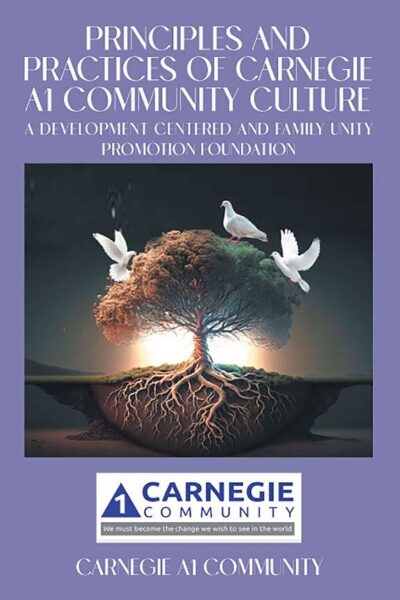Books by Ahmed Adaku
Principles and Practices of Carnegie A1 Community Culture: A Development Centred and Family Unity Promotion Foundation
Principles and Practices of Carnegie A1 Community Culture gives significant insight into the culture of the Carnegie A1 Community, a family foundation in Uganda, which is based on the descent from its founder Ahmed Adaku, as the starting point.
The ultimate goal of the community is to promote unity, honesty and the spirit of hard work among its members. It also encourages the personal development of individual members, as well as keeping the unity of members within their different individual families. All members of the community shall originate from this one great family by birth or by marriage into the family as they become part of the community.
The basis of the community’s culture is upholding the guiding principles that will help its families live a positive life, while at the same time excluding undesirable practices.
The Carnegie A1 community has many benefits because of its leadership structure, composition and mode of becoming a leader in the community. The leadership style provides clear and smooth succession which shall continue from one generation to another without greed and struggle for leadership position.
Some of the ideas of starting Carnegie A1 community and the formulation of its guiding principles stem from the founder’s previously published book, The Journey of Life: The Basic Family Principles of Living a Fulfilling Life (Strategic Book Publishing, 2025).
Reading both books will provide a complete picture of a good family life in the current society which is full of destructive forces.
The Journey of Life: The Basic Family Principles of Living a Fulfilling Life
The Journey of Life: The Basic Family Principles of Living a Fulfilling Life promotes developing a family culture based on good values. These values are derived from true religion, as well as a socially acceptable and constructive lifestyle. The book does not consider unproductive and backward traditional beliefs and destructive religious movements, but instead offers advice to help families live a positive life.
All parents want their children to carry certain values which they consider important depending on how they see the world. Parents have the absolute responsibility to shape the behavior and the kind of life their children and family live. It is important that young children know ahead of time that if certain things are not done right, there will be consequences at a later time in their lives.
As young children grow up to take on their own family responsibilities, understanding the reasoning behind their values helps hold them accountable when faced with peer pressure and more complex problems.
Emphasizing your family values is a good way to make sure everyone knows what’s important to your family. Children should be made aware of the reality of today’s world and be prepared to face the challenges and, more importantly, to face them with a positive attitude even if they seem to be unbearable.
My family principles are based on the determination to succeed and on recognizing that failures are part of success through the lessons learned from them to guide future attempts.
Sustaining the success achieved from living a principled life is attainable if practical adaptations are made in this changing world. Many still follow their traditional cultural beliefs and religion even when it is difficult to do so. Others may wish to escape their destructive culture to live a positive life. This book offers a path toward this goal.
“The majority of the formula and methods that were used to solve life problems in the past can no longer address today’s life problems.”
Young adults will especially find the author’s advice helpful.
Family Principles of Ahmed Adaku: Living a Fulfilling Life
Family Principles promotes developing a family culture based on good values, which are derived from true religion, as well as a socially acceptable and constructive lifestyle. It does not consider unproductive and backward traditional beliefs and destructive religious movements, but instead offers advice to help families live a positive life.
All parents want their children to follow the values that they consider important. Parents are responsible for shaping the behavior and the kind of life their children and family live. It is important that children know there will be consequences later in life for the actions they take today.
As children grow up to take on their own family responsibilities, understanding the reasoning behind their values helps hold them accountable when faced with peer pressure and more complex problems.
Emphasizing your family values makes sure everyone knows what’s important to your family. Children should be taught the realities of today’s world and be prepared to face the challenges with a positive attitude, even when it is difficult.
My family principles are based on the determination to succeed, and in recognizing that failures are part of success through the lessons learned that guide future attempts.
Sustaining success achieved out of living a principled life is attainable if practical adaptations are made in this changing world.
“The majority of the formula and methods that were used to solve life problems in the past can no longer address today’s life problems.”
Young adults will especially find the author’s advice helpful.
About the Author
Born in Koboko, Uganda, Ahmed Adaku grew up in the small town of Paidha, where he started his family life. He is now a businessman in Arua City and Kampala, the capital of Uganda.



